Eytan Kats
Depth to Anatomy: Learning Internal Organ Locations from Surface Depth Images
Jan 26, 2026Abstract:Automated patient positioning plays an important role in optimizing scanning procedure and improving patient throughput. Leveraging depth information captured by RGB-D cameras presents a promising approach for estimating internal organ positions, thereby enabling more accurate and efficient positioning. In this work, we propose a learning-based framework that directly predicts the 3D locations and shapes of multiple internal organs from single 2D depth images of the body surface. Utilizing a large-scale dataset of full-body MRI scans, we synthesize depth images paired with corresponding anatomical segmentations to train a unified convolutional neural network architecture. Our method accurately localizes a diverse set of anatomical structures, including bones and soft tissues, without requiring explicit surface reconstruction. Experimental results demonstrate the potential of integrating depth sensors into radiology workflows to streamline scanning procedures and enhance patient experience through automated patient positioning.
PrIINeR: Towards Prior-Informed Implicit Neural Representations for Accelerated MRI
Aug 11, 2025Abstract:Accelerating Magnetic Resonance Imaging (MRI) reduces scan time but often degrades image quality. While Implicit Neural Representations (INRs) show promise for MRI reconstruction, they struggle at high acceleration factors due to weak prior constraints, leading to structural loss and aliasing artefacts. To address this, we propose PrIINeR, an INR-based MRI reconstruction method that integrates prior knowledge from pre-trained deep learning models into the INR framework. By combining population-level knowledge with instance-based optimization and enforcing dual data consistency, PrIINeR aligns both with the acquired k-space data and the prior-informed reconstruction. Evaluated on the NYU fastMRI dataset, our method not only outperforms state-of-the-art INR-based approaches but also improves upon several learning-based state-of-the-art methods, significantly improving structural preservation and fidelity while effectively removing aliasing artefacts.PrIINeR bridges deep learning and INR-based techniques, offering a more reliable solution for high-quality, accelerated MRI reconstruction. The code is publicly available on https://github.com/multimodallearning/PrIINeR.
Internal Organ Localization Using Depth Images
Mar 30, 2025Abstract:Automated patient positioning is a crucial step in streamlining MRI workflows and enhancing patient throughput. RGB-D camera-based systems offer a promising approach to automate this process by leveraging depth information to estimate internal organ positions. This paper investigates the feasibility of a learning-based framework to infer approximate internal organ positions from the body surface. Our approach utilizes a large-scale dataset of MRI scans to train a deep learning model capable of accurately predicting organ positions and shapes from depth images alone. We demonstrate the effectiveness of our method in localization of multiple internal organs, including bones and soft tissues. Our findings suggest that RGB-D camera-based systems integrated into MRI workflows have the potential to streamline scanning procedures and improve patient experience by enabling accurate and automated patient positioning.
Self-supervised Learning of Dense Hierarchical Representations for Medical Image Segmentation
Jan 12, 2024

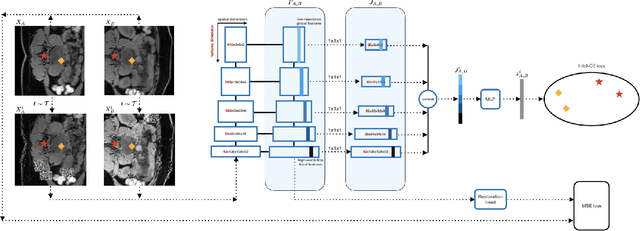

Abstract:This paper demonstrates a self-supervised framework for learning voxel-wise coarse-to-fine representations tailored for dense downstream tasks. Our approach stems from the observation that existing methods for hierarchical representation learning tend to prioritize global features over local features due to inherent architectural bias. To address this challenge, we devise a training strategy that balances the contributions of features from multiple scales, ensuring that the learned representations capture both coarse and fine-grained details. Our strategy incorporates 3-fold improvements: (1) local data augmentations, (2) a hierarchically balanced architecture, and (3) a hybrid contrastive-restorative loss function. We evaluate our method on CT and MRI data and demonstrate that our new approach particularly beneficial for fine-tuning with limited annotated data and consistently outperforms the baseline counterpart in linear evaluation settings.
A Soft STAPLE Algorithm Combined with Anatomical Knowledge
Oct 26, 2019

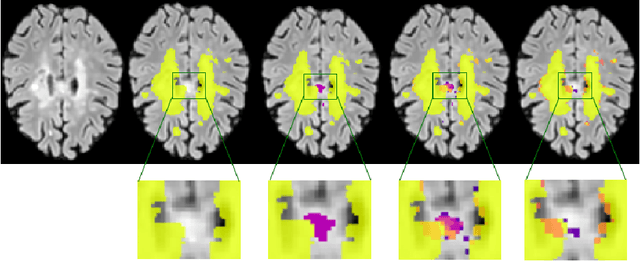
Abstract:Supervised machine learning algorithms, especially in the medical domain, are affected by considerable ambiguity in expert markings. In this study we address the case where the experts' opinion is obtained as a distribution over the possible values. We propose a soft version of the STAPLE algorithm for experts' markings fusion that can handle soft values. The algorithm was applied to obtain consensus from soft Multiple Sclerosis (MS) segmentation masks. Soft MS segmentations are constructed from manual binary delineations by including lesion surrounding voxels in the segmentation mask with a reduced confidence weight. We suggest that these voxels contain additional anatomical information about the lesion structure. The fused masks are utilized as ground truth mask to train a Fully Convolutional Neural Network (FCNN). The proposed method was evaluated on the MICCAI 2016 challenge dataset, and yields improved precision-recall tradeoff and a higher average Dice similarity coefficient.
Soft labeling by Distilling Anatomical knowledge for Improved MS Lesion Segmentation
Jan 26, 2019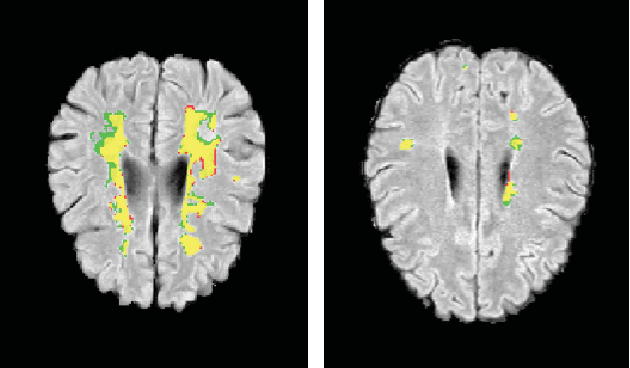
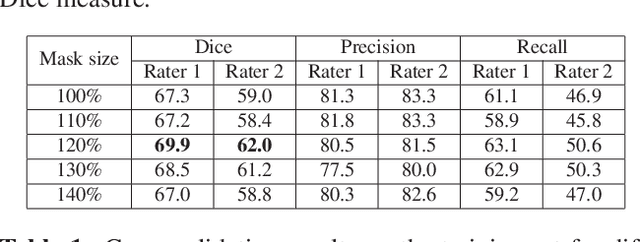
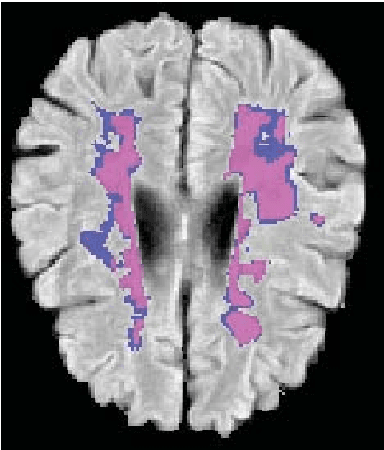

Abstract:This paper explores the use of a soft ground-truth mask ("soft mask'') to train a Fully Convolutional Neural Network (FCNN) for segmentation of Multiple Sclerosis (MS) lesions. Detection and segmentation of MS lesions is a complex task largely due to the extreme unbalanced data, with very small number of lesion pixels that can be used for training. Utilizing the anatomical knowledge that the lesion surrounding pixels may also include some lesion level information, we suggest to increase the data set of the lesion class with neighboring pixel data - with a reduced confidence weight. A soft mask is constructed by morphological dilation of the binary segmentation mask provided by a given expert, where expert-marked voxels receive label 1 and voxels of the dilated region are assigned a soft label. In the methodology proposed, the FCNN is trained using the soft mask. On the ISBI 2015 challenge dataset, this is shown to provide a better precision-recall tradeoff and to achieve a higher average Dice similarity coefficient. We also show that by using this soft mask scheme we can improve the network segmentation performance when compared to a second independent expert.
 Add to Chrome
Add to Chrome Add to Firefox
Add to Firefox Add to Edge
Add to Edge